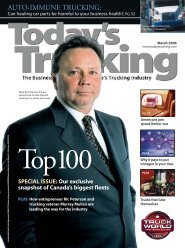You also want an ePaper? Increase the reach of your titles
YUMPU automatically turns print PDFs into web optimized ePapers that Google loves.
The following headline<br />
is factual: “<strong>Trucking</strong><br />
company agrees to pay<br />
damages in wrongful death<br />
lawsuit totaling $3,000,000.”<br />
Imagine if the company had<br />
not settled out of court. The<br />
payout could have easily been<br />
triple the settled-on amount.<br />
Of course some questions<br />
arise.<br />
“Why would this company<br />
agree to settle the lawsuit?<br />
“What would have<br />
motivated them to admit to<br />
negligent hiring and<br />
negligent entrustment?<br />
And, “what the heck are<br />
negligent hiring and negligent<br />
entrustment, exactly?”<br />
Simply put, negligent hiring<br />
means the trucking company<br />
either failed to conduct<br />
a thorough background check<br />
on the driver or—if it had and<br />
discovered that he had a<br />
previous crash resulting in a<br />
suspended license and<br />
multiple moving violation<br />
convictions—the company<br />
hired him anyway without<br />
doing anything about it.<br />
I happen to know that in<br />
the $3-million case, it was the<br />
latter, because the company<br />
also admitted to negligent<br />
entrustment.<br />
That means they allowed<br />
this driver to operate a<br />
commercial vehicle while<br />
knowing that he had previous<br />
collisions and moving violations<br />
and should probably not<br />
have been behind the wheel.<br />
Does that mean they never<br />
should have hired this driver?<br />
<strong>In</strong> this case yes, but maybe<br />
not in all cases.<br />
It’s one thing to not check<br />
a driver’s history. You already<br />
know to do that, so no<br />
attorney can ever surprise<br />
you in court by bringing up<br />
information from a driver’s<br />
past that you didn’t know<br />
about. Never hire without<br />
asking yourself, “if we were<br />
being sued because of a<br />
collision that this driver was<br />
involved in, are we sure that<br />
there is going to be no new<br />
information dug up that we<br />
were unaware of?”<br />
I assure you, in thousands<br />
of lawsuits across North<br />
America every year, employers<br />
are being surprised by<br />
information about their own<br />
employees’ pasts.<br />
So what happens when you<br />
find past indiscretions on a<br />
new hire? Should you just stop<br />
the hiring process right there?<br />
Not necessarily. But what<br />
you must do is investigate<br />
what came of those indiscretions.<br />
Did the driver receive<br />
remedial training after a<br />
crash or moving violation?<br />
How long has it been since<br />
that incident? Was there a<br />
pattern of incidents? Has the<br />
driver learned from his past<br />
and has he received upgrading<br />
or training to improve his<br />
skills? Is there a paper trail to<br />
prove that said training<br />
occurred?<br />
What generally happens in a<br />
lawsuit like this is the plaintiff<br />
attorney will try to show a<br />
history of non-compliance<br />
with rules and regulations<br />
and show that the carrier did<br />
nothing about them and<br />
allowed them to continue.<br />
Once the lawyer does that, it<br />
is very easy to prove negligent<br />
hiring and or negligent<br />
entrustment.<br />
You have to be 100-percent<br />
sure of not only the drivers<br />
you hire and their histories<br />
but also your current drivers<br />
and the steps you take after<br />
collisions, citations or incidents.<br />
Make sure they receive<br />
remedial training and or<br />
discipline, road test them and<br />
ensure they continue to meet<br />
standards and can operate<br />
safely and within the law. And<br />
document everything you do.<br />
Make sure that when you<br />
write it down, it will stand up<br />
to scrutiny by that plaintiff<br />
Street Smarts<br />
Surprised Parties<br />
safety Don’t let sneaky money-hungry litigators sideswipe you in court.<br />
By Brian Botham<br />
A trucking company<br />
involved in a crash<br />
presents a huge<br />
target to hungry<br />
litigators. And they<br />
will come after you,<br />
armed with facts.<br />
WHEN THE BOOKS COOK YOU:<br />
You should never be surprised in court.<br />
lawyer and a jury.<br />
This is why your insurance<br />
company shows up on a regular<br />
basis to go through your<br />
files and hiring practices, etc.<br />
They want to ensure that if a<br />
situation occurs you have<br />
everything in place to<br />
protect yourself and their<br />
exposure. That catch phrase<br />
you always hear—Risk<br />
Management—really means<br />
managing (and therefore<br />
minimizing) your risks.<br />
Believe me. A trucking<br />
company involved in a crash<br />
presents a huge target to<br />
hungry litigators. And they<br />
will come after you, armed<br />
with facts.<br />
The public (and many<br />
attorneys) seem to believe we<br />
are all loaded, with more<br />
millions to throw around<br />
than Tiger Woods.<br />
Maybe you are. I’m not. ▲<br />
Brian Botham, CDS, is a certified<br />
director of safety through NATMI.<br />
He can be reached at 519-533-<br />
3656 or bbotham@cmvsafety.ca.<br />
JANUARY 2010 23



